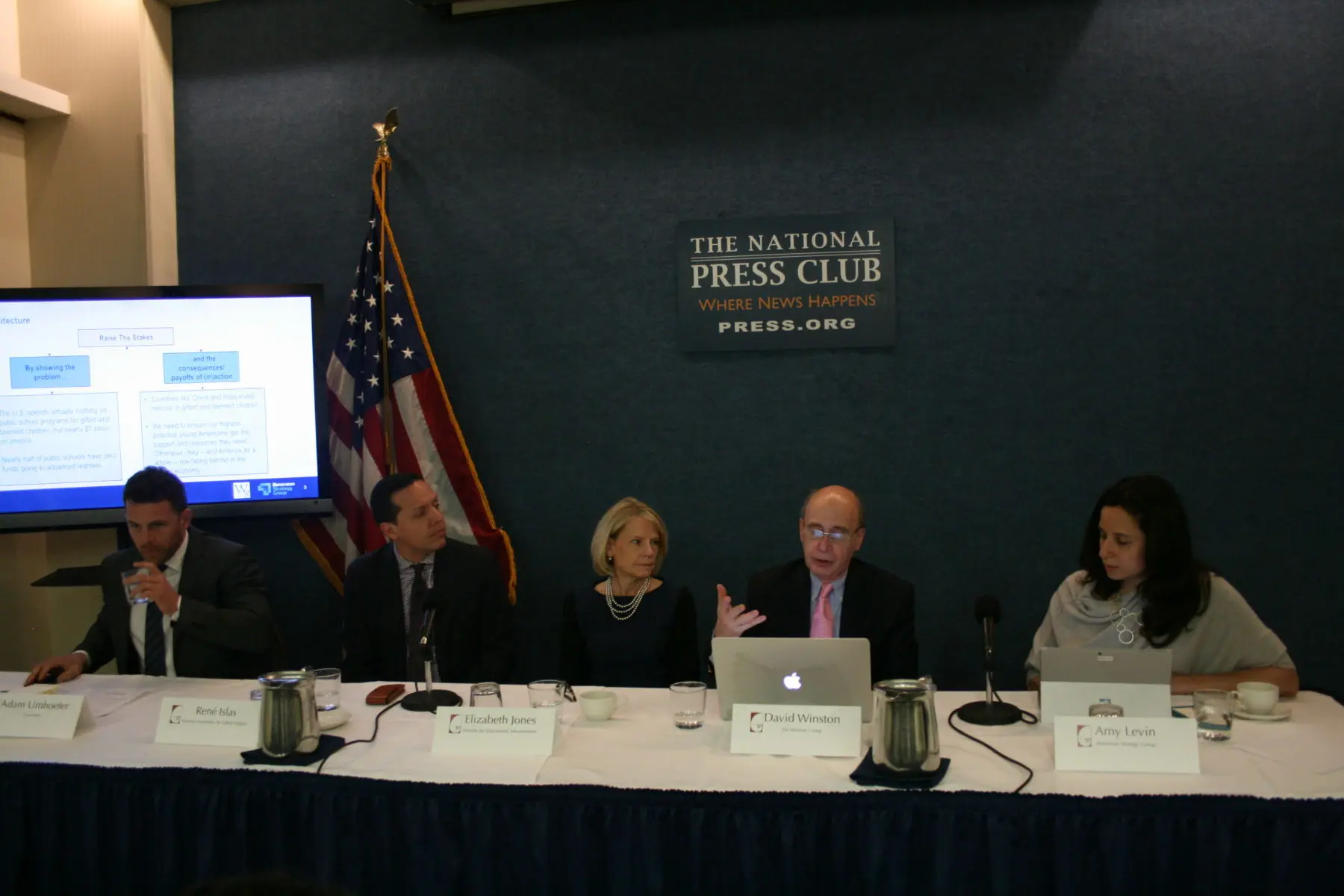At a gathering of gifted learning community leaders today in the nation’s capitol, a first-of-its-kind poll was released by the Institute for Educational Advancement (IEA), that finds overwhelming bipartisan public support for increased funding for programs and resources for gifted students.
The poll, conducted by Benenson Strategy Group and The Winston Group, found that 64% of Democrats, 67% of Independents, 61% of Republicans, and 62% of Trump voters say federal funding for gifted students needs to be increased. Only 4% of all voters polled said funding needs to be cut, and 32% said funding should be kept as is. Similarly, 63% say state funding needs to be increased. The poll is the first-ever comprehensive survey of voters on the subject of gifted learners.
“When it comes to America’s future, it is clear that progressives, conservatives, and everyone in between want the same thing – support for our highest potential learners so that our country remains an economic power in the 21st century,” said Elizabeth D. Jones, President & Co-Founder of IEA. “We are seeing overwhelming support for funding and resources to ensure that our brightest students’ minds are nurtured and supported, which hasn’t always been the case in the past. As a community, we are committed to advocating for what the public wants: helping our highest potential students succeed.”
Despite the highly charged politics of the day, the poll finds bipartisan agreement on a variety of questions including improving the training of teachers on how to identify and serve gifted students, and increasing supports for gifted students from underserved communities that have historically been under-represented in such programs. Key findings include:
-64% say federal funding for gifted students needs to be increased, while only 4% say it needs to be cut and 32% say kept as is.
– Similarly, 63% say state funding needs to be increased.
-64% of Democrats, 67% of Independents, 61% of Republicans, and 62% of Trump voters say federal funding for gifted students needs to be increased.
-Even in the face of a strong opposition attack, nearly 7-in-10 voters side with the idea that investing in gifted students is critical to America’s future.
– Just 31% agree with: Spending federal dollars on programs for gifted kids sounds great, but the country just can’t afford it. Every year it seems the federal deficit grows larger and America’s debt rises. With limitless funds it would be great to spend more on gifted kids – and all kids – but that’s just not the world we live in. For gifted programs to be funded, other programs would need to be cut, and that’s not a sacrifice we should make.
– While 69% agree with: America’s success in the 21st century relies on our commitment to the next generation. Countries like China, Singapore and India are investing in their gifted students, while the U.S. provides almost no federal funding for these programs in our schools. If America wants to remain competitive in the 21st century, we need to invest in the leaders and innovators of the future. Investing in gifted kids is investing in America’s continued prosperity.
-Voters overwhelmingly support specific policy proposals to help gifted children, with almost no partisan distinctions. Policies include improved funding to help train teachers who identify and serve gifted children (90%); improved funding to help train teachers who are educating gifted children (89%); requiring that any teacher who serves gifted children receive special training (86%) and providing additional funding to schools in underserved communities specifically to support programs for gifted students (86%)
Of students who dropped out of high school, 88% had passing grades but left due to boredom. Among the leading causes for dropping out include feeling unchallenged, unmotivated or bored. Gifted students know up to 50% of the year’s curriculum before the school year begins, which could explain the dropout correlation. There are between 3 and 5 million gifted students in the United States, and most receive the majority of their education in a regular classroom with teachers who have not been trained to teach them — as only 1% of the education budget is spent on serving gifted children. 82% of underachieving gifted students reversed their underachievement when they had opportunities for strength-based gifted programming. Programming for gifted students is made at the state and local level.
“We must make sure all gifted children have access to the services and supports they need to thrive,” said M. René Islas, executive director of the National Association for Gifted Children. “The IEA poll makes clear that with increased understanding about the nature and needs of these children, Americans support programs and practices that will help all gifted and talented children flourish.”
The Institute for Educational Advancement and the National Association for Gifted Children are working with leaders in the fields of business, education, and gifted youth to ensure that the federal government creates an infrastructure dedicated to the intellectual, creative and personal growth in the nation’s gifted and high potential youth so the U.S. can continue to be leaders in the global world.
METHODOLOGY
Benenson Strategy Group and The Winston Group conducted 1414 online interviews from December 19, 2016-January 6, 2017 with registered voters nationwide, including oversamples of: 150 Opinion Elites, 150 Parents, 150 Hispanics, and 150 African Americans. At the 95% confidence level, the margin of error for the entire sample is ± 2.51%. It is ±6.21% among Opinion Elites, ±3.73% among Parents, ±6.03% among African Americans, ± 5.81% among Hispanics, and higher among subgroups. Due to rounding, some percentages may not add up to 100%. Note that the “Parents With Gifted Child” group highlighted throughout the deck includes any member of the population identifying as having a gifted kid, regardless of that child’s age.
To learn more about IEA’s advocacy efforts, visit our Advocacy page.
This post was originally published by the National Association for Gifted Children.

